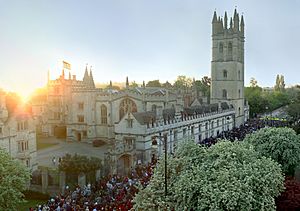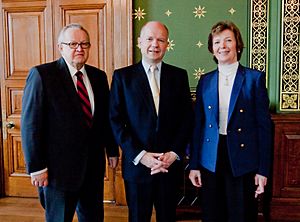William Hague facts for kids
Quick facts for kids
The Lord Hague of Richmond
PC FRSL
|
|||||||||||||||||||||||||||||||||||||||||||||
|---|---|---|---|---|---|---|---|---|---|---|---|---|---|---|---|---|---|---|---|---|---|---|---|---|---|---|---|---|---|---|---|---|---|---|---|---|---|---|---|---|---|---|---|---|---|
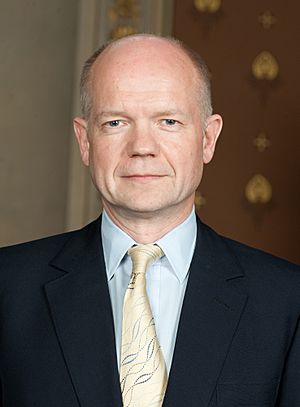
Official portrait, 2010
|
|||||||||||||||||||||||||||||||||||||||||||||
| Chancellor of the University of Oxford | |||||||||||||||||||||||||||||||||||||||||||||
| Assumed office 19 February 2025 |
|||||||||||||||||||||||||||||||||||||||||||||
| Vice-Chancellor | Irene Tracey | ||||||||||||||||||||||||||||||||||||||||||||
| Preceded by | The Lord Patten of Barnes | ||||||||||||||||||||||||||||||||||||||||||||
| Leader of the Opposition | |||||||||||||||||||||||||||||||||||||||||||||
| In office 19 June 1997 – 13 September 2001 |
|||||||||||||||||||||||||||||||||||||||||||||
| Monarch | Elizabeth II | ||||||||||||||||||||||||||||||||||||||||||||
| Prime Minister | Tony Blair | ||||||||||||||||||||||||||||||||||||||||||||
| Preceded by | John Major | ||||||||||||||||||||||||||||||||||||||||||||
| Succeeded by | Iain Duncan Smith | ||||||||||||||||||||||||||||||||||||||||||||
| Leader of the Conservative Party | |||||||||||||||||||||||||||||||||||||||||||||
| In office 19 June 1997 – 13 September 2001 |
|||||||||||||||||||||||||||||||||||||||||||||
| Deputy | Peter Lilley | ||||||||||||||||||||||||||||||||||||||||||||
| Chairman | |||||||||||||||||||||||||||||||||||||||||||||
| Preceded by | John Major | ||||||||||||||||||||||||||||||||||||||||||||
| Succeeded by | Iain Duncan Smith | ||||||||||||||||||||||||||||||||||||||||||||
|
|||||||||||||||||||||||||||||||||||||||||||||
|
|||||||||||||||||||||||||||||||||||||||||||||
|
|||||||||||||||||||||||||||||||||||||||||||||
|
|||||||||||||||||||||||||||||||||||||||||||||
| Personal details | |||||||||||||||||||||||||||||||||||||||||||||
| Born |
William Jefferson Hague
26 March 1961 Rotherham, England |
||||||||||||||||||||||||||||||||||||||||||||
| Political party | Conservative | ||||||||||||||||||||||||||||||||||||||||||||
| Spouse |
Ffion Jenkins
(m. 1997) |
||||||||||||||||||||||||||||||||||||||||||||
| Education | |||||||||||||||||||||||||||||||||||||||||||||
| Signature |  |
||||||||||||||||||||||||||||||||||||||||||||
William Hague, Baron Hague of Richmond (born 26 March 1961) is a British politician. He was the Leader of the Conservative Party and Leader of the Opposition from 1997 to 2001. He also served as Deputy Leader of the party from 2005 to 2010.
Hague was a Member of Parliament (MP) for Richmond (Yorks) from 1989 to 2015. In the government led by David Cameron, he held important roles. He was First Secretary of State from 2010 to 2015, Foreign Secretary from 2010 to 2014, and Leader of the House of Commons from 2014 to 2015. Since February 2025, he has been the Chancellor of the University of Oxford.
Hague studied at the University of Oxford and INSEAD. He became an MP in 1989. He quickly rose in government and became Secretary of State for Wales in 1995. After the Conservative Party lost the 1997 election, he was elected as their leader. He resigned after the 2001 election. Later, he became an author and worked as a consultant.
In 2005, David Cameron became Conservative leader. Hague returned to the Shadow Cabinet as Shadow Foreign Secretary. He also acted as Cameron's deputy. When a new government was formed in 2010, Hague became First Secretary of State and Foreign Secretary. He retired from Parliament in 2015 and was made a life peer, becoming a member of the House of Lords.
Contents
Early Life and Education
William Hague was born on 26 March 1961 in Rotherham, England. He went to Wath-upon-Dearne Comprehensive School. His parents ran a soft drinks business, and he helped them during school holidays.
When he was 16, Hague spoke at the Conservative Party's national meeting in 1977. He told the audience that they needed to work hard to avoid a Labour government.
Hague studied Philosophy, politics and economics at Magdalen College, Oxford. He was also President of the Oxford Union, a well-known debating society. After Oxford, he earned a Master of Business Administration (MBA) degree from INSEAD in 1986. He then worked as a management consultant at McKinsey & Company.
Political Career
Starting in Politics
Hague first ran for Parliament in 1987 but did not win. In 1989, he was elected as the MP for Richmond, North Yorkshire. He was the youngest Conservative MP at the time. In 1990, he joined the government. He worked in the Department of Social Security (DSS) and was promoted to Minister of State in 1994. His quick rise was due to his intelligence and debating skills.
In 1995, Hague became a Cabinet Minister as Secretary of State for Wales. He learned some Welsh for this role. He served in this position until the Conservatives lost the 1997 general election.
Leading the Conservative Party
After the 1997 election defeat, Hague was chosen as the new leader of the Conservative Party. He was 36 years old. His main job was to rebuild the party after their big loss. He launched a campaign called "Listening to Britain" to reconnect with the public.
Under his leadership, the Conservatives did well in the 1999 European parliamentary elections. However, his authority was challenged by Michael Portillo joining his team in 2000. This led to some disagreements within the party.
Hague was known for his strong debating skills in Parliament. He often challenged the Prime Minister, Tony Blair, during Prime Minister's Questions.
Resignation as Leader
After the 2001 general election, where the Conservative Party gained only one seat, Hague resigned as party leader. He said that the party had not convinced enough people that they were ready to govern. He was the first Conservative leader in a long time who did not become Prime Minister.
After Party Leadership
After stepping down, Hague continued to be an MP. He wrote two biographies: one about the 18th-century Prime Minister William Pitt the Younger (published in 2004) and another about the anti-slavery campaigner William Wilberforce (published in 2007). He also learned to play the piano.
Hague earned a significant income from various roles outside Parliament. He was also part of the Conservative Leadership Council. In the 2005 Conservative leadership election, he supported David Cameron, who eventually won.
Return to the Shadow Cabinet
In December 2005, David Cameron became the new Conservative Party leader. Hague accepted the role of Shadow Foreign Secretary. He also became a Senior Member of the Shadow cabinet, acting as Cameron's deputy. He often filled in for Cameron during Prime Minister's Questions.
Foreign Secretary
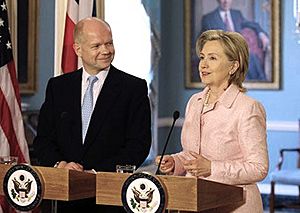
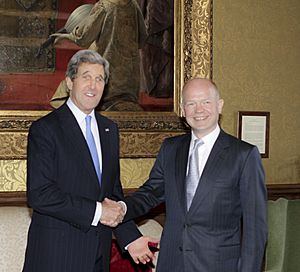
When David Cameron became Prime Minister in 2010, he appointed Hague as Foreign Secretary. Hague was also given the honorary title of First Secretary of State. His first overseas visit as Foreign Secretary was to Washington, D.C., where he met US Secretary of State, Hillary Clinton.
Hague emphasized a foreign policy based on values, including human rights. He stated that human rights are important for foreign policy. However, he faced some criticism for increasing aid to Pakistan despite concerns about the treatment of its Christian minority.
In 2012, Hague continued to stand in for David Cameron at Prime Minister's Questions when both the Prime Minister and Deputy Prime Minister were out of the country. In 2013, he launched the International Leaders Programme to build partnerships with future global leaders.
Middle East Protests
In 2011, Hague spoke about the protests happening in the Middle East and North Africa. He stressed the need for peaceful action and respect for human rights. He condemned the use of force by authorities in countries like Bahrain and Libya. He said that governments using violence against their people would "pay an increasingly high price."
He also commented on the Syrian civil war, calling for political reforms and condemning the violence. In 2012, the UK started training Syrian opposition activists and providing non-lethal equipment. Hague recognized the Syrian National Council as a "legitimate representative" of the Syrian people.
In March 2012, Hague ordered the evacuation of all British diplomats from Syria due to security risks. He stated that this decision did not reduce the UK's commitment to finding a solution. In August 2013, the British Parliament voted against military strikes in Syria. Hague continued to urge other governments to take action against the use of chemical weapons.
Falkland Islands
In 2012, Hague spoke about the Falkland Islands on the 30th anniversary of the Falklands War. He reaffirmed Britain's commitment to the islanders' right to choose their own future. He said that British military deployments to the Falklands were "entirely routine."
Julian Assange
In August 2012, Hague stated that Julian Assange, the founder of WikiLeaks, would not be granted political asylum by the United Kingdom. He confirmed that the UK was legally required to extradite Assange to Sweden. Hague emphasized that the UK was committed to a diplomatic solution and denied any threat of raiding the Ecuadorian Embassy, where Assange was staying.
Leader of the House of Commons and Retirement
Before the 2015 general election, Hague announced he would not seek re-election as an MP. He stepped down as Foreign Secretary and became Leader of the House of Commons. In this role, he managed government business in Parliament. He also continued to advise David Cameron.
On his last day in the House of Commons, Hague made a surprise move to change how the Speaker is elected. This caused some debate. He was succeeded as MP for Richmond (Yorks) by Rishi Sunak.
In Retirement
On 9 October 2015, William Hague was made Baron Hague of Richmond, which means he became a member of the House of Lords.
In 2020, Hague supported Joe Biden for US president. In 2025, he became an honorary patron of the GEMS School of Research and Innovation in Dubai.
Fighting Illegal Wildlife Trade
While Foreign Secretary, Hague and the then Duke of Cambridge recognized the serious problem of the illegal wildlife trade (IWT). In 2014, they formed the Transport Task Force (TTF) to help stop wildlife trafficking. They continue to work on this issue.
Royal Foundation
In September 2020, Hague became the chairman of the Royal Foundation. This is a charity that operates under the guidance of the then Duke and Duchess of Cambridge.
Chancellor of the University of Oxford
In October 2024, Hague announced he would run for Chancellor of Oxford University. He said that Oxford had "transformed" his life and prepared him for challenges. On 27 November 2024, the University announced that Hague had been elected Chancellor. He officially started this role in February 2025.
Personal Life
Hague married Ffion Jenkins on 19 December 1997. She is now known as The Lady Hague of Richmond.
Hague is a vice-president of the Friends of the British Library. He is also a Patron of the European Youth Parliament UK, which organizes debating competitions. He enjoys judo and has a strong interest in music. He also loves the natural history and countryside of his home county, Yorkshire.
In 2015, Hague bought a country house called Cyfronydd Hall in Wales.
Awards and Honours
- 1998: The Spectator's "Parliamentarian of the Year Award"
- 2005: History Book of the Year for his book William Pitt the Younger
- 2007: The Spectator's "Speech of the Year Award"
- 2009: Fellow of the Royal Society of Literature (FRSL)
- 2015: Freeman of the City of London
- 2015: Life peerage
- 2017: Grand Cordon of the Order of the Rising Sun (Japan)
See also
 In Spanish: William Hague para niños
In Spanish: William Hague para niños
- Tory Boy
 | Laphonza Butler |
 | Daisy Bates |
 | Elizabeth Piper Ensley |


